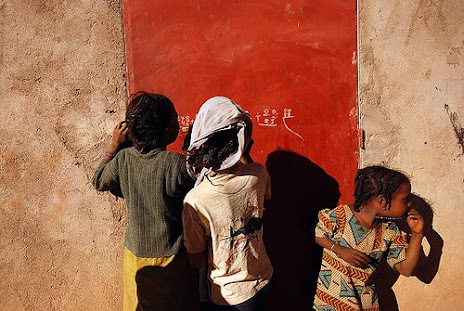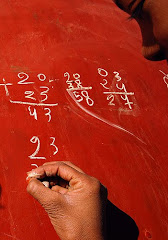As I read through chapter 5, my thoughts returned time and again to Chapter 4. I felt like I had a little more to say I guess and wanted to make this post before we discuss the next chapter. The more I read the more I realize how much there is to do to make a classroom an inviting, exciting arena for mathematical learning/understanding. The teachers at Amber Hill, however good intentioned they may be, were not being effective, shouldn't they have been able to see that? I turn the mirror on myself and ask if I have not also been guilty of this very thing. I pay much closer attention now to the what and why when planning and get a great sense of satisfaction from knowing that the small changes I've made can be built upon and its all good for the students!
As long as I'm looking in that mirror I must admit that I have been guilty of 'excessive prompting' in the past. Allowing students to think, that break between question/problem and answer is excruciating. I have noted that the students have noticed the changes too, at times they have such quizzical looks on their faces as in " When is Miss going to step in?" It is a bit of a tight-rope walk and a lot of getting rid of bad habits to know when is the right time to step in. I struggle on! What has inspired me to be aware is the idea that Boaler presented from her observations at Amber Hill " The teachers thought that students would not or could not think" this " learned helplessness" is something I do not want to be a part of continuing. I know there will be times when I will 'fall of the wagon' so to speak but it has become an important issue for me.
Finally, when I think about all that I read and learned in chapter 4, differences between teacher beliefs and actions, the development of negative student attitudes toward mathematics, the lack of true mathematical understanding have all been eye opening for me. However, it is the idea that the students from Amber Hill were considered to have inadequacies based on the social group they were identified as having come from, that bothered me the most. The studies Anyon, ( 1981) cites that find that schools in lower socio-economic areas "discouraged personal assertiveness and intellectual inquisitiveness in students and assigned work that most often involved substantial amounts of rote activity" is perhaps, shameful! ( maybe that's too strong a word? Hmm?) As I comb through research for this course I have come across the following quote, "All students regardless of their personal characteristics, backgrounds, or physical characteristics must have the opportunity to study - and support to learn - mathematics (NCTM, 2000, p.12) hallelujah brother, say it again! Equity is certainly one of the critical issues facing mathematics education today, Amber Hill certainly demonstrates that.
Video Links Have Been Moved!
Wednesday, October 14, 2009
Subscribe to:
Comments (Atom)

